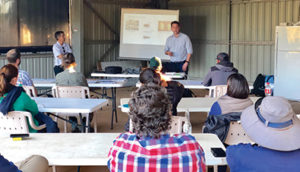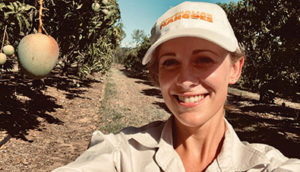Read the latest information on
Foot-and-mouth disease
Some of Australia’s larger plant industries have partnered with Plant Health Australia (PHA) and appointed biosecurity specialists as a way of providing the latest biosecurity advice and assistance to growers.
These specialists also communicate with others in the supply chain to support regional and interstate biosecurity efforts. In many cases, they are considered ‘the face of biosecurity’ for an industry.
You can contact these biosecurity officers if you need help with any aspect of biosecurity on your farm.
Grain industry: In partnership with Grain Producers Australia, Grains Biosecurity Officers are employed as part of the Grains Farm Biosecurity Program, funded by producer levies and governments. The officers are located within the agriculture departments in five states.
More information and contact details
Citrus industry: The National Citrus Biosecurity Manager with Citrus Australia is Dr Jessica Lye.
You can email Jessica.lye@citrusaustralia.com.au or call 0427 352 742.

Vegetable and potato officer Callum Fletcher speaking to growers in Carnarvon, WA, while Vegetables WA Vietnamese industry extension officer, Truyen Vo, translates. Image courtesy of AUSVEG
Vegetable and potato industry: In partnership with AUSVEG, the Vegetable and Potato Farm Biosecurity Program is an extension and engagement program funded by vegetable growers.
Two dedicated biosecurity officers develop extension and training material, write articles on biosecurity themes for industry magazines, engage with producers at field days, and liaise with growers during pest incursions.
Contact info@ausveg.com.au
Honey and pollination industry: In partnership with the Australian Honey Bee Industry Council (AHBIC), the National Bee Biosecurity Program is funded by AHBIC with support from the state governments helps beekeepers to manage pests that are already in Australia and to prepare for incursions by exotic pests. Bee biosecurity officers are employed in five states, and actively promote adoption of the Australian Honey Bee Industry Biosecurity Code of Practice.
More information and contact details

Cairns-based industry development officer with the Australian Mango Industry Association, Marine Empson. Image courtesy of AMIA
Other industries – for example Nursery and Garden Industry Australia, Melons Australia and Mangoes Australia – have appointed specialists to help growers to implement biosecurity measures on-farm. Please contact your peak industry body for further details.
Please don’t hesitate to take advantage of the biosecurity advice on offer.